Ah yes, March. It’s that time of the season when good teams clinch playoff spots and bad teams get mathematically eliminated from postseason contention. It’s when some teams start to play so-called “meaningless games” later in the month. It’s when we start talking about trophy finalists and complaining about the playoff format.
One conversation that has crept its way into the hockey world is the viability, and the merits, of load management. It’s not a mainstream topic yet unless you’re talking about goalies, and even then we don’t like to call it load management. We say stuff like “you need two decent goalies to be competitive” or “you can’t ask your starter to play 70 games anymore”, but something about the words “load” and “management” side-by-side seems heinous to NHL fans.
Related: One for the Ages: Doug Harvey’s 1968-69 NHL Season
Dom Luszczyszyn, ever the trailblazer, wrote a fascinating piece on load management a few weeks ago (from ‘”Load management”’ in hockey: Why it isn’t happening, why it should and why it probably won’t,’ The Athletic, 02/18/2020).
But Dom is a stats guy, a pro journalist, and analyst. I was curious to know what your everyday NHL fans think about this controversial topic. And while I would hardly consider my fellow writers at The Hockey Writers (THW) to be ordinary fans, they are everyday people with a passion for the game. That’s when I got the idea to do a THW writers’ poll on load management.
The following are anonymous THW contributors responding to questions about load management in the NHL. I hope you enjoy them as much as I did.
(For the purposes of this article, load management is defined as healthy scratching star players during the regular season in hopes of improving their performance OR preventing injuries.)
THW Writers Have Their Say on Load Management
If (hypothetically) NHL teams were to practice load management, which of the following scenarios makes the most sense to you? Why?
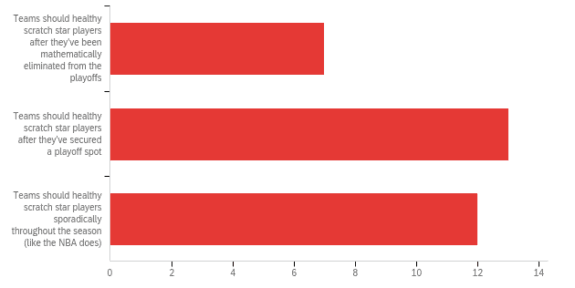
“Hockey is about rhythm and consistency. Scratching players before the playoffs has more downside than upside, as any player will tell you game speed is entirely different from practice. Potential injury risk is worth keeping your stars in game shape and mentally in the right space.”
“The entire purpose of the regular season is to make the postseason. Scratching your stars sporadically throughout the regular season is just going to diminish your chances of winning games and eventually earning a playoff spot. It just makes the most sense to give your stars a deserved and much-needed rest once you’ve secured a spot in the playoffs.”
Related: Top 10 NHL Goalie Prospects
“In my opinion, if healthy scratch rules were to be put into effect, it seems best that the NHL does it sporadically. Being mathematically eliminated from, or clinching a playoff spot leaves the window for rest smaller than if it were to be sporadic. It might benefit players more to have a night off whenever the timing feels right to the player or coach.”
“Hockey is much more random than the NBA. Sitting out a star player could lead to a loss in a crucial two points. I could only see it being done with teams in last place, like if Dylan Larkin were to rest up on some games in Detroit.”
“Load management only seems plausible if a team has nothing to lose by resting star players. But it would hurt the integrity of the game if mathematically eliminated teams rest their stars.”
“Load management throughout the year hurts those that buy tickets, but saving the players for the playoffs ensures the best team possible is available. If it was common practice, at least people would know that they could potentially not see the star players if buying tickets late in the season.”
“Once a team has secured a playoff spot, there’s really little point to playing your star players a lot. Unless they are fighting for a division title or positioning.”
My Take: There is at least surface-level merit in each of these scenarios. From a purely scientific perspective, I think sporadically scratching players throughout the season is the most beneficial to the health and performance of the players.
If you secure a playoff spot with two weeks left in the season, star players may not perform at their best in the playoffs after two straight weeks of time off.
When I think about load management, one of the first scenarios that comes to mind is Connor McDavid’s devastating knee injury from game 82 of the 2018-19 season. One of the most heartbreaking aspects of that event, in my opinion, is that McDavid had absolutely no reason to be in that game.
Related: Brian Leetch – The Road to the 1994 Conn Smythe Trophy
The Edmonton Oilers had already been eliminated from the playoffs. The Calgary Flames had already secured home ice against the Colorado Avalanche in the playoffs. The outcome of the game had no bearing on the standings, it was the definition of a meaningless game. And yet the career of the best player on earth took a serious turn for the worse because of it. If there was ever an argument in favor of option 1, which was the least popular among THW writers, that would be it.
———————————–
If (hypothetically) NHL teams were to practice load management, which of the following scenarios makes the most sense to you? Why?
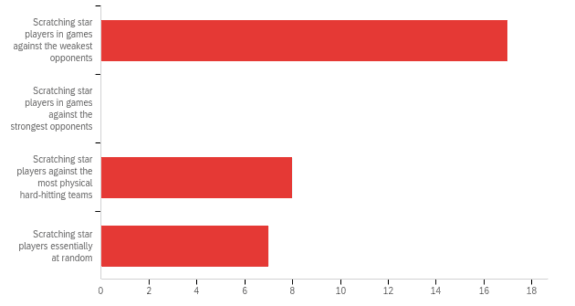
“It would not be a good look if you scratched star players for certain scenarios. It could make sense, but doing it at random is the least damaging to your reputation.”
“Although any team can beat another on any given night, it would probably make the most sense to give stars rest when playing against a weaker opponent. Also, it gives young guys their chance to shine.”
“Scratching against physical teams would make sense, but those are also often the hardest to beat where you need the stars. Plus, it would cause resentment in the locker room.”
“Unless they’re on a hot streak or needing a quick spark, players like Connor McDavid don’t need to risk injury while playing the Red Wings.”
“Try to take advantage of the Detroits of the league whenever you can. You can’t bank on winning when you sit a star player, so put yourself in a position to do it. If you lose to a bad team, you sat your best player so it can be understandable. Beating them also feels a little sweeter.”
“I think the first scenario makes the most sense. Against a weaker organization, you would have the opportunity to recall your young prospects who might be on the cusp of being an NHL regular, and give them a taste of the game at the highest level.”
“Say the Lightning were playing the Red Wings, they could likely get away with resting someone like Steven Stamkos or Nikita Kucherov and still win the game.”
My Take: Putting this article together made me realize just how important it is to let the players themselves ultimately be in charge of their load management. They should sit out when they feel it would benefit them the most, and coaches should involve them in every step of the decision-making process.
I agree with the argument that scratching star players against the most physical teams, while it would make the most sense in preventing injuries, would probably create resentment in the locker room. Scratching them against bottom-feeder teams, and thus giving prospects a chance to log NHL minutes, would make the most sense out of the options above.
———————————–
What do you think is the biggest barrier standing between the NHL and load management?
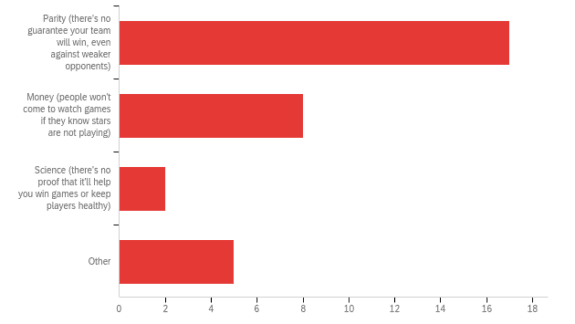
“I think parity is a huge factor, but money is a valid reason too. If a casual fan buys tickets for a game, only to see the stars get scratched, it could alienate potential consumers.”
“Unfortunately, at the end of the day hockey is a business. Fans won’t want to come to games if they know that their star players are not playing when they could be. They want to see them, and won’t pay money to see the third and fourth line players.”
“I think player egos will get in the way. Hockey has established itself as this ‘manly’ sport in which only the toughest survive. I feel anything that could get in the way of that, even if it’s for the betterment of a player’s health, would be looked down upon.”
“Money. Fans come to see their teams give their best effort. If Connor McDavid and Leon Draisaitl are scratched in an Oilers game, the appeal to watch the game has suffered greatly.”
“Other: Hockey players live up to a higher standard, the same as most football players.”
“Parity and money. The sport’s cap is supposed to go down next season, so the NHL can’t risk turning off fans. Missing and making playoffs is often the difference of five points in the standings.”
“It’s a combination of money and parity. The teams won’t do it for parity. The league would step in because of money.”
My take: In hindsight, I probably should have added another option to the responses: the players themselves could be a barrier standing between the league and load management.
Athletes have a lot of pride. I don’t necessarily buy the argument that hockey players are just too “tough and manly” to voluntarily sit out of a game while healthy. But I would argue that the players who would most likely take games off are those chasing franchise records, personal records, or trophy consideration.
Would Alex Ovechkin subject himself to load management while he is chasing Gretzky’s goal record? Would a player sit out voluntarily when he is in a tight race for the Art Ross Trophy, or close to breaking his own career-best in points? I’m not inside players’ heads, I don’t know how much these awards and accomplishments mean to them. But I assume they are an important factor when considering load management.
———————————–
How would you feel, as a fan, if your team scratched its two best players on the same night for load management? Would you still watch?
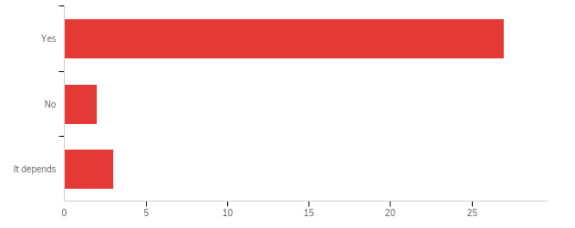
“I would because I want to see how the young guys do, but I think a large majority would not. Imagine paying tickets to see Crosby and he doesn’t show. That would piss people off.”
“I would watch but I’m not your typical fan. Scratching the best two at once would be too much. Teams would have to ease into it. Take turns, and sparingly.”
“I love hockey, what can I say?”
“If you’re dedicated enough as a fan, you’ll watch no matter who’s on the ice. However, there would definitely be a high level of frustration if I knew I wasn’t seeing my team at its very best because our stars are healthy scratched, especially if the game resulted in a loss.”
“I would watch, but I don’t think it should be more than one person per night.”
“It depends. As stated earlier, if the game is against a weaker team, it might present opportunities for young future stars to get a taste of the NHL. In addition, it could be interesting to see who steps up in a situation like this. However this is likely the mindset of a hardcore hockey fan. Casual fans will likely opt out of this one.”
“Like most fans, I want to see the best players play. Hockey is entertainment, and that’s one of the reasons I watch it, to see the skill and creativity of the best players in the game.”
My take: This is the closest the survey ever came to reaching a consensus. A vast majority of THW writers said that they would continue to watch games even if they knew star players would be sitting out for load management. Many argued, however, that more casual fans would opt out of watching.
The pragmatist in me would argue that if you would watch an Oilers game while McDavid was injured, you should have no problem watching if he was scratched from the roster for load management. The on-ice product is exactly the same.
However, I suppose some fans may refuse to watch such a game on principle, as an act of rebellion. I once ran a Twitter poll asking Oilers fans if they would pay to see a game where McDavid was healthy scratched for load management. The majority said no.
———————————–
Do you feel that NHL fans should receive advance notice if a star player will be scratched for load management? Or should the NHL proceed like the NBA, where fans are not notified in advance which games star players will miss?
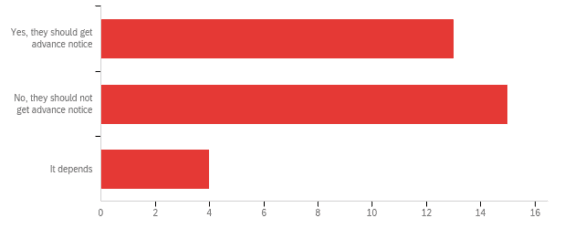
“I get why the fans should know, but at the same time I believe load management should be specifically for when the player feels he needs a rest. He wouldn’t be able to predict that weeks or likely even days in advance.”
“Because families often can only afford to go to one game per season, they should have the opportunity to see the team play with its full strength. This isn’t an injury situation that pops up out of nowhere.”
“Giving advance notice is the only way it will work. You have to let the fans know. It’s only fair to them so they can choose if they still want to watch/attend.”
“As much as fans want to know, this is still a business. You can’t have 2,000 people show up in Buffalo when they sit Eichel on a Tuesday night in February against the Coyotes.”
“Whether people want to admit it or not, they often buy tickets to see a specific player. Sometimes, that can even be a player on the other team that you are paying to watch your team play against. So yes, maybe letting people know in advance that a star won’t be playing would stop them from buying tickets to the game, but that seems more integral than leading fans to believe a player will be in the lineup, only to find out that they paid for tickets to watch that player sit healthy on the bench.”
“I would hate to come to a game, after spending my hard-earned money, expecting to see Elias Pettersson and find out that he’s not playing due to “load management”. That would really get to me as a fan.”
“No, they should not get advance notice. Load management should be about what’s best for the team, and that’s for the coach to handle. Load management should not be about the fans.”
My take: This question was a doozy. It sparked some of the most passionate, and polarizing, responses. The answers were fairly evenly split.
I think respondents were divided on whether teams should do the right thing, or the smart thing. Integrity versus practicality.
The right thing to do would be to give fans advance notice before scratching star players. Imagine a young Pittsburgh Penguins fan driving across the state to attend his first game. Tickets are paid for and the trip has been planned for months. The day before the game, news breaks that Sidney Crosby won’t be playing due to load management. Devastating.
However, in the end hockey is a business. If fans are less motivated to attend games where star players are not on the ice, it does not make financial sense for the team to provide advance notice.
I myself had to mull this one over for a bit. Ultimately I decided once again that load management should be for the benefit of the players, not the fans. Players would not be able to predict in the preseason which regular-season games they will want to skip.
If fans are angry or feel deceived when star players get healthy scratched in the regular season, something tells me they will find forgiveness in their hearts if the team makes it to a Stanley Cup Final with a healthy roster.
———————————–
To the best of your knowledge, which of the following are plausible benefits to load management in the NHL? (select all that apply)
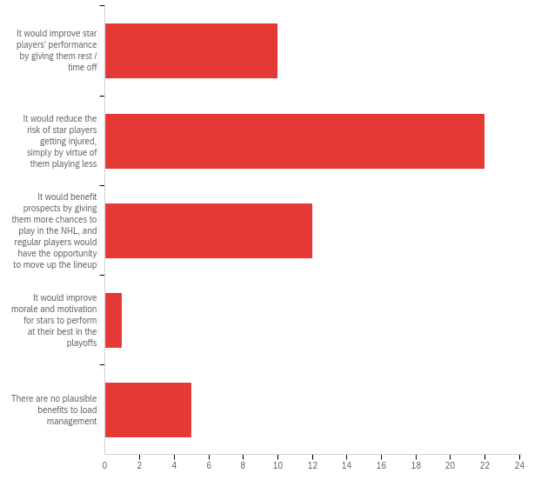
To the best of your knowledge, which of the following are plausible drawbacks to load management in the NHL? (select all that apply)
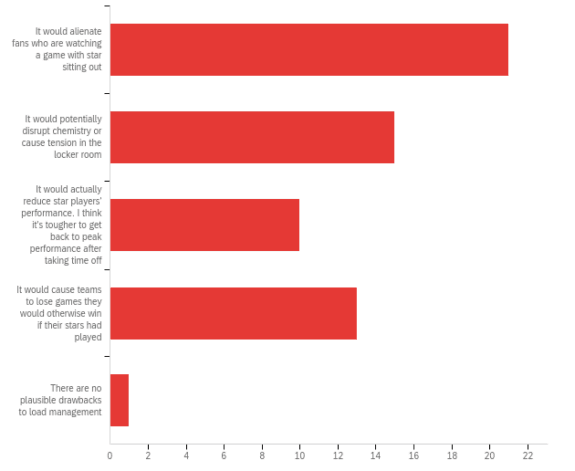
My take: There’s no question that load management in the NHL, no matter how teams approached it, would have benefits and drawbacks.
I was surprised at the number of people respondents who said load management would actually hinder star players’ performance. The argument: too much time off makes you rusty.
Remember that last season William Nylander had essentially two straight months of load management while his contract was getting negotiated. When he came back to the NHL for the latter half of the season, he just wasn’t his old self. If there was ever a case study in favor of the sporadic approach to load management, rather than taking prolonged periods of time off, this may be it.
Still a Long Way from Consensus
So there you have it.
I was surprised to see such even splits in a lot of these answers. The data set is not huge, but this small sample of well-informed fans provides a glimpse of the divides that still exist within hockey fandom.
If NHL teams eventually do decide to implement some form of load management, there will probably not be one way to pull it off and keep everyone happy. Coaches and team executives would have to face some tough choices and weigh the risks and rewards of each.